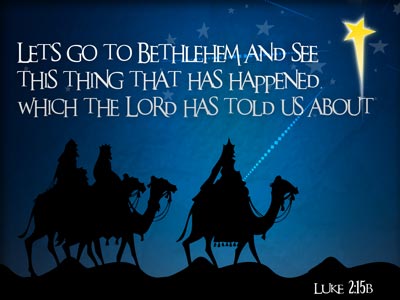-
Insignificant? Not To God.
Contributed by David Mcnally on Nov 28, 2017 (message contributor)
Summary: At Christmas we remember the birth of Jesus our Saviour in the 'little town of Bethlehem', an insignificant little town in the middle east, but nothing and no one is insignificant to God, who loves every human being and sent His only-begotten Son to die o
Micah 5 v. 2
Nothing is ‘insignificant’ to God
‘O little town of Bethlehem ……………..’
The first time that Bethlehem appears in the scriptures
is in Genesis 35.
We can read how Jacob, the son of Isaac and grandson of Abraham loved Rachel and married her
after working for her brother Laban for 14 years.
Rachel died after giving birth to Benjamin, her 2nd son,
Joseph of the many coloured coat fame being her firstborn.
Rachel was buried just outside Bethlehem
and when Genesis 35 was written
it says ‘to this day’ the pillar that Jacob set over her tomb
was still there.
I first visited Bethlehem in 1995
when I stayed at the Ramat Rahel kibbutz,
and I saw Ramat Rahel or Rachel’s tomb
which is holy to Jews, Christians, and Muslims.
In Judges 12 verse 8 we learn that one of the inhabitants of Bethlehem
was a man called Ibzan, who had 30 sons and 30 daughters,
and who was a Judge over Israel for 7 years.
In Judges 17 verses 7 and 9 there is an account of a Levite
who lived in Bethlehem who left the town
in search of a job as a priest somewhere else.
In the book of Ruth, chapter 1, we learn about a time
when there was a famine in Judah,
so a resident of Bethlehem called Elimelech
went with his wife Naomi and their 2 sons
to live in the country of Moab.
The sons married Moabite girls, but did not live happily after
because the two sons died and so did their father.
One of the Moabite widows went back to her family
but the other one, Ruth,
stayed with her mother-in-law when she returned to Bethlehem.
Ruth would eventually marry Boaz and have a son called Obed
who would in turn have a son called Jesse,
who would be the father of David, King of Israel,
which is why Bethlehem is often called ‘Royal David’s city’.
We can read in 1st Samuel chapter 16
how the Lord told Samuel to go from his home town of Ramah
to Bethlehem
to anoint David the son of Jesse as King of Israel,
as God was displeased with King Saul.
In 2nd Samuel chapter 23 we can read about a time
when David was being besieged by the Philistines
and was ‘holed up’ in the cave of Adullam.
The Philistines had captured and occupied Bethlehem.
In 2nd Samuel 23 verse 15 we learn how David,
who often ‘thought out loud’
exclaimed how he longed to be able to drink some water,
but not just any water,
specifically water from the well near to the gate of Bethlehem,
and near to Rachel’s tomb.
Probably he was just wishing that the battle was over
and that he and his men could have free access to Bethlehem.
Anyway, the 3 mighty men who had fought the Philistines
along with him, Josheb-Basshebeth, Eleazar and Shammah,
took it upon themselves to make the king’s wish come true.
They fought their way through the Philistine lines
and got to the well and drew water and carried it back to David,
probably in an animal-skin bag.
David was so impressed by their valour,
and probably so ashamed by his own lack of it,
that he refused to drink a drop,
but poured it out as an offering to God.
Apart from these few instances
Bethlehem is not mentioned anywhere else in the OT,
being merely an insignificant town a few miles south,
perhaps an hour’s walk, from Jerusalem;
and in the NT it is not mentioned at all
apart from in the birth narratives.
Jesus was brought up in Nazareth, preached
and spent most of his time in or around Capernaum,
and died and was resurrected in Jerusalem,
and it will be to Jerusalem that he will return
after his parousia or 2nd Coming.
Bethlehem in the county of Ephrathah in Judah
was never an important place in Israel,
compared to Jerusalem or Bethel, Shechem or Shiloh,
and some would say that even these places were not very significant
compared to cities such as London or New York,
but God communicated through the prophet Micah
some time between 750 and 686BC,
during the reigns of Jotham, Ahaz and Hezekiah, kings of Judah,
that this otherwise insignificant little town
would be the birthplace of the Messiah.
Micah predicted the fall of Ephraim, the Northern kingdom of Israel
which separated from the southern kingdom of Judah
after the death of Solomon, and it did fall, to the Assyrians in 721BC.
This is why Micah is called a ‘prophet of doom’.
However, he also prophesied the coming one day
of the Messianic Deliverer,
and this is why Micah is also called a ‘prophet of hope’.
Bethlehem today is still a ‘little town’,

 Sermon Central
Sermon Central



